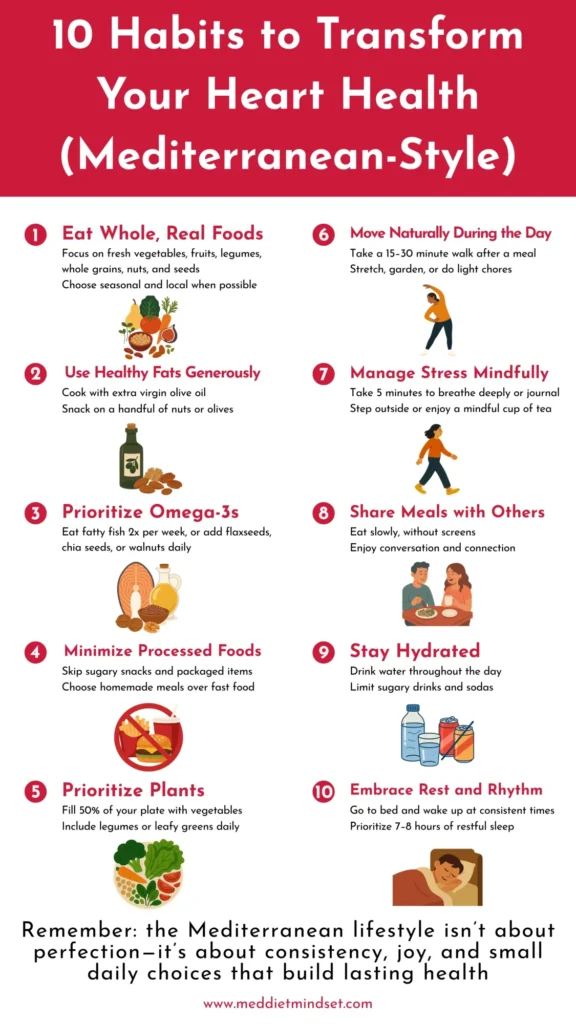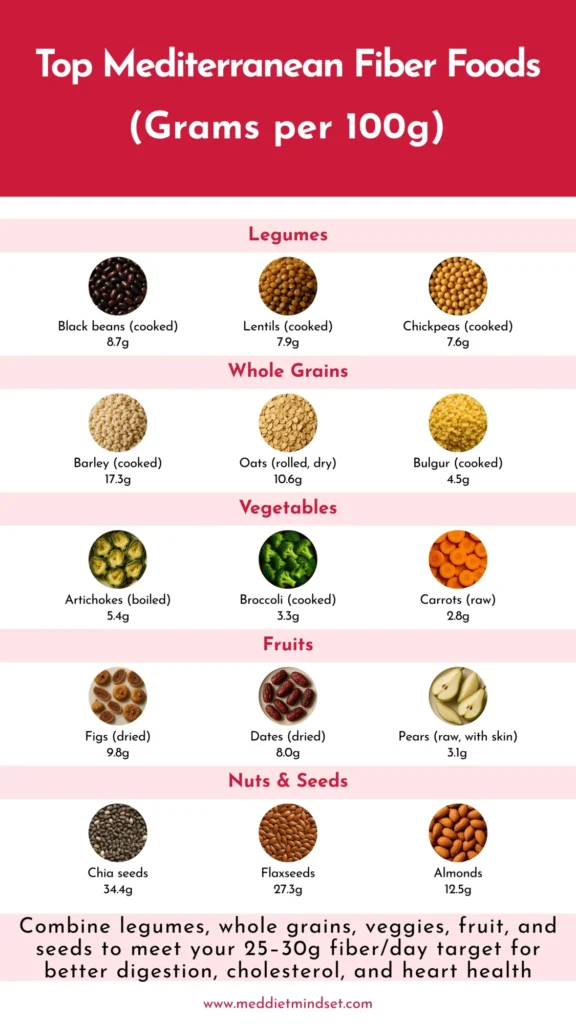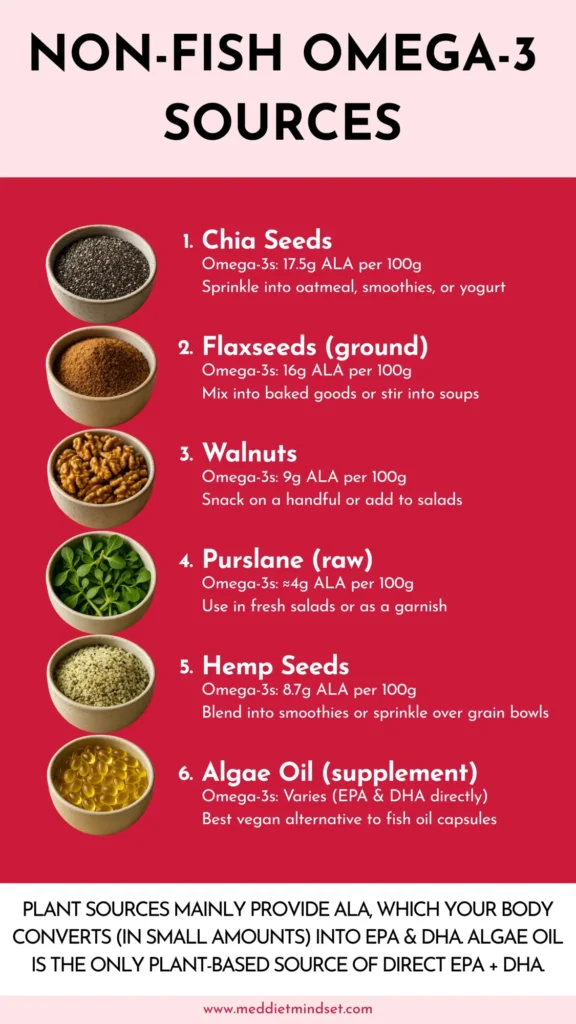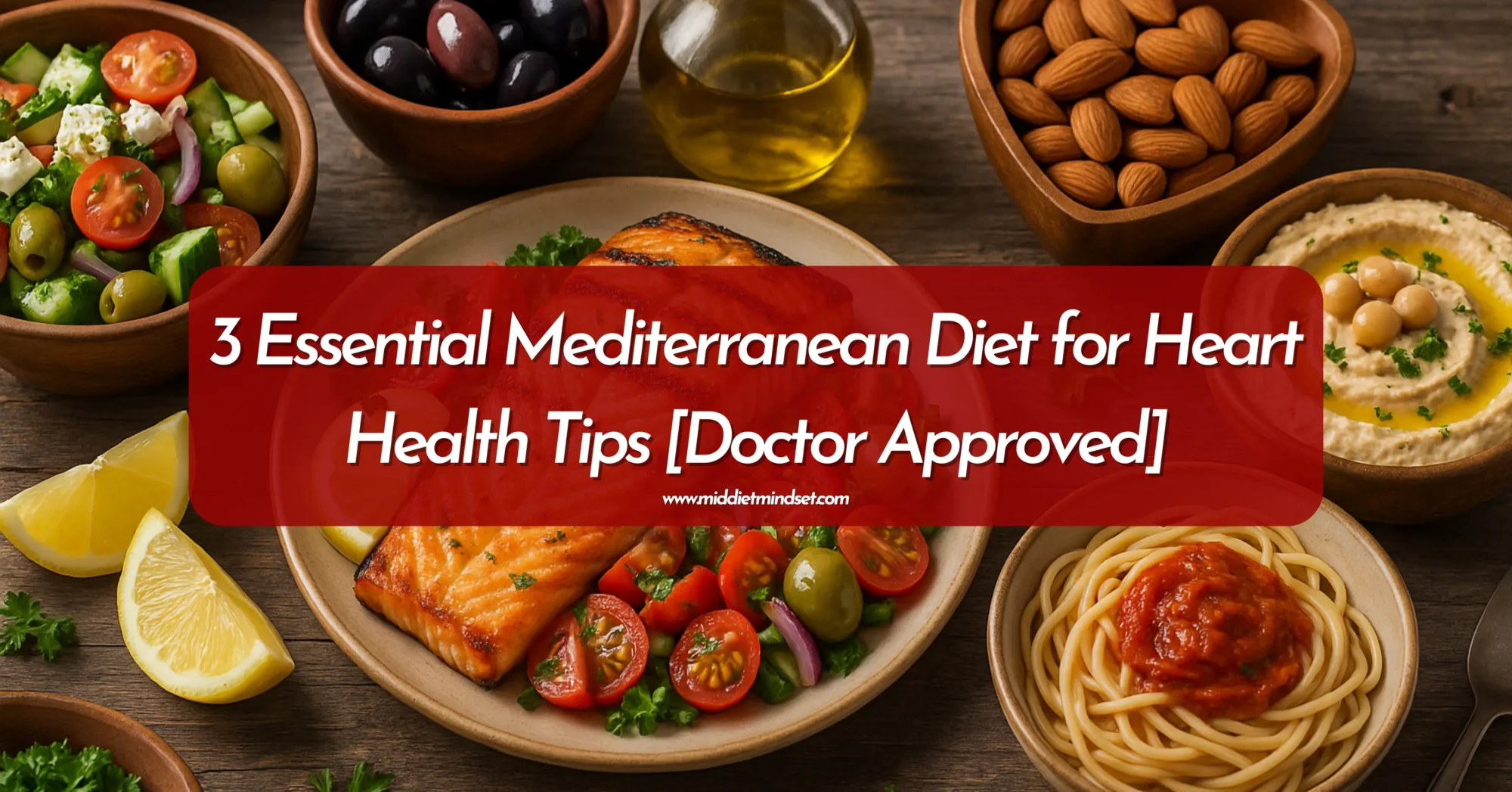Table of Contents
ToggleHeart disease is often called the “silent killer” for a reason. It can progress quietly for years without a single symptom—until one day, it leads to a life-threatening event. High blood pressure, clogged arteries, and elevated cholesterol don’t always feel urgent in the moment, which is why many people don’t take action until it’s too late. But here’s the truth: your daily habits—especially the way you eat—play a major role in protecting your heart, and that’s exactly where the Mediterranean Diet for Heart Health proves its strength.
The Mediterranean Diet for Heart Health isn’t restrictive or trendy—it’s a proven, balanced approach that emphasizes flavor, variety, and sustainability. More than a diet, it’s a lifestyle rooted in culture, supported by science, and tailored to nourish your cardiovascular system from the inside out. From olive oil and fish to fresh vegetables and legumes, every choice builds toward a stronger, healthier heart.
One thing that makes the Mediterranean Diet and Cholesterol connection so compelling is that it’s all about inclusion—not deprivation. Instead of removing everything you enjoy, this diet encourages simple upgrades: swap butter for extra virgin olive oil, trade processed snacks for colorful produce, and enjoy fatty fish in place of heavy meats. These everyday shifts improve cholesterol levels and overall metabolic health in a sustainable, enjoyable way.
When my father discovered his LDL cholesterol was creeping into dangerous territory, he panicked. He thought his only option was cutting out all fats and living on steamed veggies forever. Instead, we took a different route rooted in the Mediterranean Diet for Heart Health. He replaced margarine with olive oil, added grilled salmon and lentils to his weekly meals, and started walking each evening after dinner. Within just a few months, his energy returned, his numbers dropped, and he felt healthier and more in control.
That transformation wasn’t extreme. It was a reflection of how powerful the Mediterranean Diet for Heart Health can be when embraced consistently. And this isn’t just his story—it’s one I’ve seen time and time again, both in my personal life and with clients who adopt this heart-protective lifestyle.
The best part? You don’t have to give up the foods you love to protect your heart. You simply need to build your daily routine around nutrient-rich foods and active, mindful living. In this article, I’ll walk you through three doctor-approved strategies rooted in the Mediterranean Diet for Heart Health to support lower cholesterol, improved blood flow, and long-term cardiovascular wellness.

1. Eat More Healthy Fats (Not Less!)
Why Olive Oil Is the Real MVP
For decades, the word “fat” has been unfairly blamed for everything from weight gain to heart disease. But today, we know better. It’s not about cutting fat entirely—it’s about choosing the right types of fat. One of the core principles of the Mediterranean diet for heart health is its generous use of healthy unsaturated fats, especially those found in extra virgin olive oil.
Unlike saturated fats—commonly found in butter, palm oil, and processed snacks—olive oil contains heart-supportive monounsaturated fats that help lower LDL (bad cholesterol) while preserving HDL (good cholesterol). But that’s not all. Extra virgin olive oil also offers polyphenols, natural plant compounds that reduce inflammation and oxidative stress in the arteries. These combined effects improve blood vessel flexibility, lower blood pressure, and reduce your overall cardiovascular risk.
This is one reason olive oil is more than just a cooking ingredient in Mediterranean kitchens—it’s considered a health elixir. It’s used daily and generously, not feared or limited. And that’s exactly why it’s the foundation of the Mediterranean diet for heart health.
If you’re new to using olive oil regularly, start with simple swaps. Drizzle it over salads or roasted vegetables, mix it into hummus, or use it as your go-to cooking oil for sautéing and baking. Avoid heating it to extremely high temperatures, and always opt for extra virgin for the most health benefits.
The Power of Fatty Fish
Healthy fats don’t stop at olive oil. Another powerful component of the Mediterranean Diet and Cholesterol support system is fatty fish—particularly salmon, sardines, mackerel, and anchovies. These oily fish are rich in omega-3 fatty acids, which have a profound effect on cardiovascular health and are a key element of the Mediterranean Diet for Heart Health.
Omega-3s help reduce triglycerides, support a steady heart rhythm, decrease blood clotting, and improve the structure and flexibility of arterial walls. They also reduce inflammation, which is now recognized as a major contributor to heart disease and atherosclerosis. This makes omega-3s especially important for those following the Mediterranean Diet for Heart Health.
Including fatty fish at least twice per week is a standard recommendation within the Mediterranean lifestyle—and it’s one of the most impactful things you can do to support better lipid balance. In fact, it’s a core dietary strategy in the Mediterranean Diet and Cholesterol management approach. It’s not just about lowering the “bad”—it’s about strengthening your heart with protective, nourishing foods.
And if you’re not a fan of fish? You still have options. While marine omega-3s are the most potent, plant-based sources like walnuts, chia seeds, and flaxseeds provide alpha-linolenic acid (ALA)—a beneficial fat that supports cardiovascular function and fits perfectly into the Mediterranean Diet for Heart Health. These ingredients can be sprinkled into oatmeal, blended into smoothies, or used as part of a heart-friendly breakfast routine.
Together, olive oil and omega-3-rich foods make up the healthy fat duo that lies at the core of both the Mediterranean Diet for Heart Health and Mediterranean Diet and Cholesterol improvement strategies. Prioritizing these foods daily can help reduce risk factors and build a strong foundation for lifelong cardiovascular wellness.
Want to explore more non-fish sources of omega-3s? Check out this blog post for a full list of Mediterranean-approved omega-3 options.
What Science Says
“Replacing saturated fats with unsaturated fats—especially olive oil and fish oils—within the Mediterranean dietary pattern is associated with significant improvements in serum lipid profiles and a lower risk of cardiovascular disease.”
— Nutrients, 2025, Scaglione et al.
Pro-Tips
- Swap butter for extra virgin olive oil in all your cooking—especially in dressings, marinades, and roasting
- Add a tablespoon of ground flaxseeds to oatmeal or yogurt every morning to support better lipid balance
- Grill or bake salmon, sardines, or mackerel twice a week, paired with lemon, garlic, and fresh herbs
- Keep a jar of olive oil mixed with herbs and garlic by the stove for an easy heart-healthy drizzle
- Snack on a handful of walnuts or almonds instead of processed chips or crackers
Takeaway
Don’t fear fat—choose the right kind. Swapping in olive oil and fatty fish for saturated fats is one of the simplest and most effective steps you can take to protect your heart.
2. Pack Your Plate with Plants
Fiber Is Your Heart’s Best Friend
When we talk about nutrients that support heart health, fiber doesn’t always get the spotlight—but it should. Among its many benefits, soluble fiber plays a direct and powerful role in managing cholesterol levels. It works by binding to excess cholesterol in the digestive tract, preventing it from being absorbed into the bloodstream. This is especially important when your goal is to lower LDL (the “bad”) cholesterol—the kind that clogs arteries and increases your risk of cardiovascular disease.
The Mediterranean Diet for Heart Health naturally includes many fiber-rich foods, especially those high in soluble fiber. Lentils, chickpeas, white beans, oats, eggplant, apples, and pears are just a few examples that appear regularly on Mediterranean plates. These foods do more than just lower cholesterol—they also slow digestion, stabilize blood sugar, and promote long-lasting satiety. That means fewer cravings, better portion control, and improved overall metabolic health—all critical goals of the Mediterranean Diet for Heart Health.
Fiber also supports a healthy gut microbiome, which emerging research shows is directly tied to inflammation and heart health. A diverse gut microbiome—nourished by plant-based fiber—may lower systemic inflammation, which is another contributor to arterial damage. This gut-heart connection adds another layer of benefit to a Mediterranean Diet for Heart Health, reinforcing how food choices influence multiple systems.
Want to learn which Mediterranean foods help fight inflammation? Check out this article on anti-inflammatory Mediterranean foods to add to your plate today.
To get the most benefit, aim for 25 to 30 grams of fiber per day, with a strong emphasis on legumes, whole fruits, vegetables, and whole grains. Even small swaps—like replacing refined pasta with whole-grain options or adding lentils to your salad—can have a measurable impact over time and fit seamlessly into the Mediterranean Diet and Cholesterol-focused eating pattern.
By prioritizing plant-based fiber, you’re not only improving digestion—you’re actively working toward better cholesterol numbers, reduced inflammation, and a more resilient heart. That’s why plant-forward eating is such a foundational element of both the Mediterranean Diet for Heart Health and the broader Mediterranean Diet and Cholesterol management approach.
Antioxidants and Nitric Oxide Boosters
Fiber is only part of the plant-based power equation. Fruits and vegetables are also loaded with antioxidants, flavonoids, and nitrate-rich compounds that directly protect your heart and blood vessels.
These compounds reduce oxidative stress, one of the silent contributors to chronic inflammation and arterial stiffness. In other words, they help prevent the very damage that leads to heart disease. This is one reason why populations that follow a Mediterranean diet for heart health—with their high intake of colorful produce—tend to have lower rates of hypertension, stroke, and atherosclerosis.
Certain plant foods offer especially powerful effects. Spinach, beets, arugula, and citrus fruits are rich in precursors to nitric oxide, a molecule that helps dilate and relax blood vessels. Better dilation means lower blood pressure and smoother circulation—two big wins for the heart.
And don’t forget berries, tomatoes, and red cabbage—these are high in anthocyanins and lycopene, two antioxidants that have been shown to protect against LDL oxidation. Since oxidized LDL is one of the most dangerous forms of cholesterol, these foods are essential tools in the Mediterranean diet and cholesterol toolkit.
As a rule of thumb, the more colors you add to your plate, the more diverse your antioxidant intake will be. Color variety isn’t just about presentation—it’s about giving your body a wide range of nutrients that work synergistically to protect your cardiovascular system.
What Science Says
“High intakes of fruits, vegetables, and legumes—core components of the Mediterranean diet—are consistently associated with reduced LDL cholesterol and improved endothelial function.”
— The Journal of Nutrition, 2020, Shannon et al.
Pro-Tips
- Add lentils or chickpeas to soups, grain bowls, or roasted vegetable dishes
- Fill half your plate with vegetables at lunch and dinner—aim for at least three different colors
- Snack on a pear, apple, or berries with a small handful of almonds or walnuts for a fiber-antioxidant combo
- Try making a beet and arugula salad with lemon juice and olive oil to boost nitric oxide naturally
- Use roasted eggplant, zucchini, and tomatoes as a hearty side dish or plant-based main
Takeaway
A fiber- and antioxidant-rich plate is your heart’s best friend. Make plants the star of every meal to naturally lower cholesterol and reduce inflammation.

3. Eat Like the Mediterranean—But Live Like One Too
Walk It Off—Literally
It’s easy to think that the Mediterranean Diet for Heart Health is only about food. But in reality, it’s a full lifestyle approach—and daily movement is a major part of that equation.
In traditional Mediterranean cultures, physical activity isn’t something people have to plan—it’s part of everyday living. Walking to the market, taking the stairs instead of the elevator, tending to a garden, or biking to visit a friend are all small but frequent actions that align perfectly with the Mediterranean Diet for Heart Health and help reinforce its protective effects.
When it comes to cardiovascular wellness, movement plays a direct role in improving blood circulation, lowering triglyceride levels, boosting HDL (the “good” cholesterol), and reducing abdominal fat—a major risk factor for heart disease. These benefits work in synergy with the Mediterranean Diet and Cholesterol management strategies, amplifying results through a powerful lifestyle combination.
One particularly effective habit is walking after meals. Just 10–15 minutes of light activity after your largest meal can regulate blood sugar, aid digestion, and support cholesterol metabolism. Over time, this simple practice—alongside the Mediterranean Diet for Heart Health—can lead to meaningful improvements in cardiovascular markers.
If you’re starting from a sedentary routine, don’t worry. Begin with a short evening walk or a midday stretch. Then slowly build up to 30 minutes of movement most days of the week. This isn’t just beneficial for your heart—it improves energy, sleep, digestion, and emotional balance.
In the Mediterranean Diet for Heart Health, food and movement are inseparable. One nourishes your body from the inside, the other keeps it active, resilient, and thriving. When both are practiced consistently, the benefits extend beyond numbers on a lab report—they transform your daily life. That’s the true power of the Mediterranean Diet and Cholesterol synergy.
Stress Less, Connect More
Food is just one ingredient in the Mediterranean lifestyle. Emotional well-being, social connection, and stress management are equally vital pillars of the Mediterranean Diet for Heart Health.
In traditional Mediterranean cultures, meals are more than just fuel. They’re meaningful rituals. People pause their day to share food, conversation, and laughter with others. This slower, more intentional approach to eating—central to the Mediterranean Diet for Heart Health—has been shown to reduce stress hormone levels, improve satiety, and foster stronger emotional well-being. When you enjoy meals with others, you naturally eat more mindfully, feel more satisfied, and experience lower stress levels—all of which benefit your cardiovascular system.
On the flip side, chronic stress wreaks havoc on the heart. Elevated cortisol can contribute to high blood pressure, systemic inflammation, and unstable blood sugar—all of which increase cardiovascular risk and interfere with cholesterol regulation. When stress becomes chronic, even a clean diet may not fully protect your heart. That’s why emotional balance is a necessary companion to the Mediterranean Diet for Heart Health—not just a nice-to-have.
The Mediterranean Diet and Cholesterol benefits are greatly enhanced when paired with daily stress-reduction habits. And the good news? These habits are simple and accessible. Breathing exercises, prayer or meditation, journaling, spending time in nature, or even enjoying a screen-free meal with a loved one can help calm the nervous system and support a healthier heart.
Ultimately, moments of joy, connection, and mindfulness act as medicine. When you prioritize emotional nourishment alongside nutritional choices from the Mediterranean Diet for Heart Health, you’re building a resilient, well-rounded approach to cardiovascular wellness.
What Science Says
“Adherence to the Mediterranean lifestyle, which includes daily activity, stress reduction, and communal meals, is associated with reduced cardiovascular events and mortality.”
— The Journal of Nutrition, 2020, Shannon et al.
Pro-Tips
- Walk for 10–15 minutes after dinner or your largest meal to help lower blood sugar and triglycerides
- Make one meal per day screen-free and shared—even if it’s just with one other person
- Begin or end your day with 5 minutes of stillness: deep breathing, journaling, or quiet reflection
- Set an alarm every 60–90 minutes during work hours to stand up and stretch or walk for 2 minutes
- Build “movement snacks” into your day—take the stairs, park farther away, walk while on phone calls
Takeaway
Food alone isn’t enough—how you move, eat, and manage stress matters. A heart-healthy life is about daily rhythms, not just diet rules.

Final Thoughts
Protecting your heart doesn’t have to mean restriction, calorie counting, or eliminating entire food groups. The truth is, the most sustainable changes are the ones that feel natural—and that’s exactly why the Mediterranean diet for heart health is so powerful.
This lifestyle isn’t built on fear or deprivation. It’s built on abundance, variety, and enjoyment—delicious meals prepared with fresh ingredients, shared with others, and rooted in simple daily habits that nourish both the body and mind.
By focusing on just three core pillars:
Healthy fats from olive oil and fatty fish
A plant-rich plate filled with fiber, antioxidants, and color
A lifestyle of regular movement, joy, and meaningful connection
…you’re doing more than eating well. You’re creating an environment that supports a stronger heart, better cholesterol balance, and long-term health.
The beauty of the Mediterranean diet and cholesterol support lies in its flexibility. There’s no perfect day, no one-size-fits-all rulebook. It’s about making small, intentional shifts—replacing butter with extra virgin olive oil, adding lentils or chickpeas to your lunch, walking after dinner instead of crashing on the couch. These steps may seem simple, but over time, they can radically improve your cardiovascular health.
And it’s not just about your numbers. People who adopt the Mediterranean way of eating and living often experience more energy, better digestion, improved mood, and stronger immunity. You’ll feel the difference long before you see it on a lab report.
So if you’re overwhelmed by where to begin, don’t wait for the “perfect plan.” Just start. Choose one habit aligned with the Mediterranean diet for heart health and commit to it today. Then build from there. Momentum will follow.
Because when you nourish your body with real food, surround yourself with people who uplift you, and move through life with intention—your heart takes notice.
Want a simple way to boost heart health? This Mediterranean lifestyle makeover shows you how.
F.A.Q.
Yes—absolutely. The Mediterranean diet for heart health is one of the most effective and sustainable eating patterns for managing cholesterol levels naturally. Unlike restrictive diets that cut out entire food groups, this lifestyle focuses on balancing healthy fats, increasing fiber intake, and reducing processed foods, which all work together to support healthy cholesterol profiles.
Specifically, the Mediterranean diet and cholesterol connection is supported by how it lowers LDL (bad) cholesterol while helping to raise HDL (good) cholesterol. By emphasizing extra virgin olive oil, omega-3-rich fish, legumes, and whole plant foods, the diet helps reduce inflammation, improve lipid metabolism, and support arterial health without the need for extreme restrictions.
If you’re concerned about high cholesterol, adopting the Mediterranean way of eating offers both short-term improvements and long-term protection for your cardiovascular system.
Most people begin noticing positive changes in cholesterol levels, blood pressure, and energy within 4 to 6 weeks of consistently following the Mediterranean diet for heart health. These results can be even more pronounced when dietary changes are paired with daily physical activity, reduced stress, and better sleep hygiene—all essential elements of the Mediterranean lifestyle.
In terms of the Mediterranean diet and cholesterol, you may see measurable reductions in LDL cholesterol and triglycerides during your next blood test, especially if you’re replacing processed foods and saturated fats with olive oil, fish, nuts, and fiber-rich vegetables.
Keep in mind that results vary depending on your baseline health, level of commitment, and genetics—but the key to lasting impact is consistency. The longer you stick with it, the better your outcomes will be—not just for cholesterol, but for your overall quality of life.
Yes, you can still benefit from the Mediterranean diet for heart health even if you don’t include fish in your meals. While fatty fish like salmon and sardines are excellent sources of omega-3 fatty acids and offer unique heart-protective benefits, they’re not essential to reap the rewards of this lifestyle.
The Mediterranean diet and cholesterol benefits are still accessible through plant-based omega-3 sources such as walnuts, flaxseeds, chia seeds, and even algae-based supplements, which can be effective alternatives for those avoiding seafood. Additionally, olive oil, legumes, whole grains, fruits, and vegetables continue to play a vital role in lowering inflammation and improving blood lipid profiles.
If you’re plant-based or simply not a fan of fish, you can absolutely still follow a heart-protective Mediterranean approach—with a few mindful substitutions that ensure you’re still getting the nutrients your cardiovascular system needs.

Nour is a registered dietitian, nutrition researcher, and founder of MedDietMindset. With a passion for evidence-based nutrition, she specializes in Mediterranean diet strategies, PCOS management, and sustainable weight loss. Nour is dedicated to transforming complex scientific research into clear, actionable guidance to support healthier, long-lasting lifestyle changes. Through her blog, she empowers readers to build habits that prioritize well-being, balance, and vitality.
